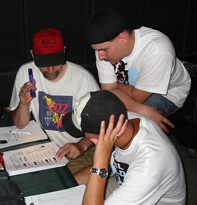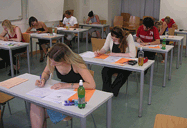Amateur radio is a popular technical hobby and volunteer public service that uses designated radio frequencies for the non-commercial exchange of messages, wireless experimentation, self-training, and emergency communications.
Why would I want to become a ham?
To become a radio amateur, licensed to transmit, you will need a brief period of study, and to pass a simple practical and theory examination.
If any of the following apply to you, you might be interested in finding out more:
- Into shortwave radio listening?
- Want to understand how radio works?
- Used a CB radio, and looking to explore other areas of the radio spectrum?
- Played with a walkie-talkie as a kid, and want to know more?
- Looking for a diverse technical hobby?
- Keen to further your knowledge and technical understanding?
There are so many directions that the hobby can take you in – here are just a few examples:
What you can do
- Chat to locals from your home and whilst ‘mobile’ using the 2 metre and 70cm bands
- Talk to other operators in the UK, Europe and around the world
- Link your computer to your radio and the Internet using technologies such as EchoLink (think Skype for Amateurs), PSK31 and JT65
- Talk to the International Space Station – Most astronauts are licensed amateurs and are occasionally available for a contact as they fly over
- Experiment with radio – Investigate different aerial types, radios and transmission modes. Some amateurs are even bouncing signals off the moon
- Take part in contests – See how far you can get, and how many contacts you can make
- Events in the community and helping out in emergencies
- Learn and operate Morse code (known as CW), and communicate around the world
- Special events – Amateurs are often out-and-about spreading the word
More than any of these though – amateur radio is about making friends. It’s a community, and amateur radio operators are keen to share their knowledge and help others, through the shared language of radio.
How do I get started?
You have to get a licence to operate amateur radio equipment and to transmit on the amateur radio frequencies, but that’s not a big deal. There are many amateur radio clubs that can teach you the basics, and help you to take the first steps. The following video clip gives you an overview of how to get started in the hobby:
Foundation Licence
The Foundation licence is your gateway to amateur radio.
The course and exam that leads to the licence provides you with an exciting introduction to the hobby while requiring an acceptable minimum level of skill and experience.
Your Foundation licence is recognised by the UK communications regulator Ofcom, and entitles you to take a unique identifier called a callsign which will be used to identify you when you are transmitting.
 The course
The course
The Foundation courses take place locally in a friendly and informal environment and are conducted by experienced radio amateurs, usually at a local radio club.
Most of the training is practical, there is a small amount of radio and electronics theory but only enough for you to appreciate things like using the correct fuses in your equipment and how to build an antenna to get the most out of your radio station.
Your course will take 10 to 12 hours to complete, and can be spread out over a few weeks or weekends
Foundation: Practical
All Foundation licence holders are required to demonstrate that they can connect and use an amateur radio transmitter and antenna. The practical assessments have to be completed in front of a Registered Assessor – Normally, a local amateur radio club can help with practical sessions.
The tutors hand-hold you through the process and assess you as the course progresses. The practical part of the course helps you to understand what to do when you get your licence, and how to get on-air safely. Practicals include:
- Basic radio operation – Tuning in, changing frequency and transmitting
- Connecting a radio, antenna and power supply
- A short transmission on a VHF/UHF amateur band
- A short transmission on an HF amateur band
- Adjusting a dipole antenna
- Sending and receiving a short phrase in Morse code (you don’t need to learn Morse)
The exam
Don’t be put off by the thought of having to do an exam.
The Foundation exam is very straightforward and consists of 26 multiple choice questions which you have 55 minutes to answer.
The questions are in the following categories:
- Amateur Radio and Licence Rules
- Technical Basics

- Transmitters & Receivers
- Feeders and Antennas
- Signal Propagation
- EMC (avoidance of interference)
- Operating Practices
- Safety
Your exam paper is checked by the invigilator straight after the exam so you will have a good idea if you have passed before you leave.
The formal marking is carried out electronically at the RSGB Examinations Department.







